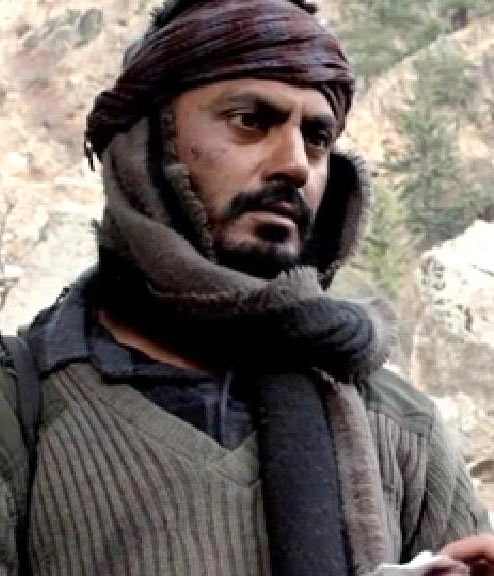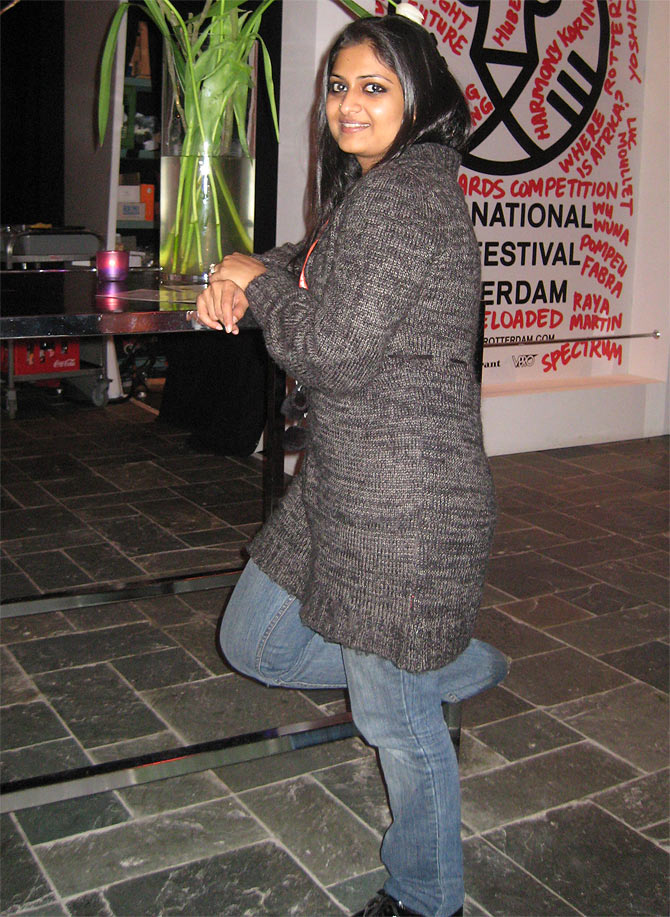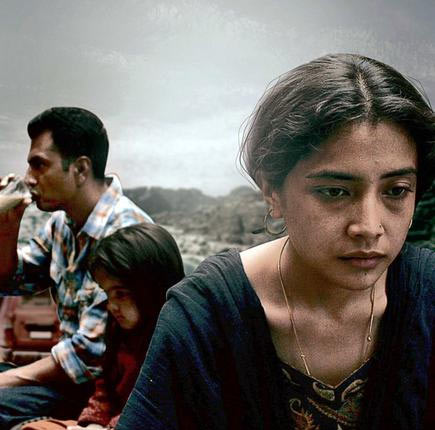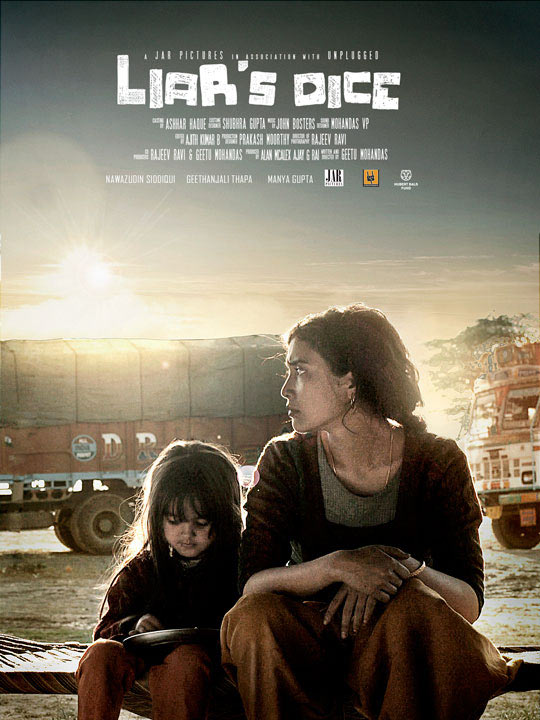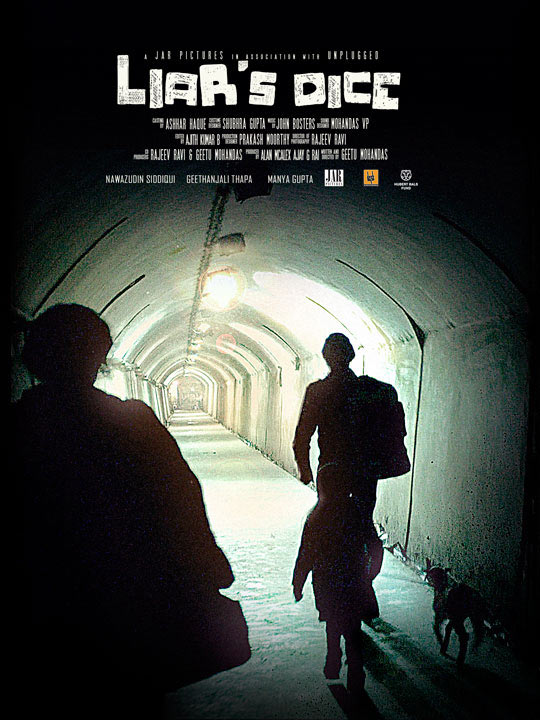 | « Back to article | Print this article |
'Sundance selection has changed everything for me'
Geetu Mohandas made her entry into the world of films as a four-year-old in the Malayalam film Onnu Muthal Poojyam Vare, in 1986. Now, in 2014, her debut feature film in Hindi, Liar's Dice has been chosen for the prestigious Sundance Film Festival in Utah in the US.
It is the second Indian film after Peepli Live to be chosen for the competitive section. The film will be featured in the ‘World Cinema Dramatic Competition’ category of the famous festival.
Liar's Dice has Nawazuddin Siddiqui, Geetanjali Thapa and Manya Gupta playing lead roles. The cinematographer is Mohandas’s husband, Rajeev Ravi, who was behind the camera for Dev D, and Gangs of Wasseypur etc.
In this interview, Geetu Mohandas talks about her career and why she feels its a big achievement to be a part of the Sundance Film Festival.
How did you feel when the film got selected for the Sundance Film Festival, the only Indian film this year, and the second Indian film after Peepli Live?
When I heard the news there were so many emotions in me. I felt I didn't let my team down. We are yet to give payment to so many people. Now, we can make money out of this film.
It was very exciting. When you start making such a small film, the only intention is to somehow complete it. Even a release was a faraway thought for me. It was very exciting for me to receive such news.
Now, so many new avenues have opened up for the film. We can even have a commercial release. I see there is a change in the attitude of people who initially didn't want to even finance it. Everything has changed with one Sundance!
The day Sundance was announced, the whole world also woke up to us. Now, we are picking and choosing film festivals.
I am on cloud nine. I think the biggest thing that can happen to a filmmaker, especially a debutante, has happened to me. I cannot but thank my lucky stars.
'The film has a very socio-political undercurrent'
Every day we read in the newspapers about a migrant labourer falling from a construction site and dying. This is reported as if the person is faceless and nameless and just a number. Is that why you made a film on them?
Definitely. The film has a very socio-political undercurrent. The very fact that these people have become numbers, statistics, in the papers made me make a film on them. In this era of globalisation where only success is talked about, poor people have become a mere statistic when there is a tragedy. This is the political stand I want to take.
I am narrating a story in a very linear fashion about a woman, a child, and their lamb going across the mountains in search of the man who had gone to the city in search of a job.
I was very interested to see the dynamics of how a family would react when the man of the house disappears in the city.
You mean when they hear about the death of the person?
No. The film doesn't talk about the death of the person. We only talk about the man missing.
The wife wants to find out what happened to her husband, and thus starts the journey. Along the journey, she meets a stranger and has to take his help. What happens between the man and the woman is the rest of the film.
Are you talking about the strength of a woman from a village who has not even stepped out of her village, but goes on a long journey to an unknown place in search of her husband?
Yes, that is the premise. It doesn't matter whether the woman is educated or not; it is her will power that matters. It is how she overcomes all difficulties to find out about her husband. In a way, it is about the plight of this woman.
'The lamb in the film is used as a metaphor'
You said a lamb also travels with the woman and the child. Did you use the lamb as a metaphor?
Yes, the lamb is used as a metaphor. You will know how the metaphor is used when you see the film. Just like this man becomes a prey in the big city, the lamb also becomes a prey.
How did the image of the lamb come to your mind?
I think it all began like magic, like most of the things that happen in movies. You have a story, you set the story in a place and the lamb also appears in it.
I don't know when the lamb appeared in the story but it was certainly not intentional. The girl had a pet lamb in the story and the lamb travels with them, and later on a lot of things happen in their lives and that was when I decided to use the lamb as a metaphor.
'My husband helped me find the right location for the film'
Liar's Dice is a gambling game. In the film, who deceives who?
Basically, it is a gambling game played by Nawaz's character throughout the film to make some extra quick bucks. The woman becomes the catalyst in the game he plays.
How long did it take you to find the right location?
My husband (Rajeev Ravi) is well travelled and knows most parts of India quite well. He suggested we go to Himachal Pradesh. We found this little village in Himachal bordering Tibet and China. No shooting has happened there, and I found it quite interesting.
In fact, even the dialect of the film is very colloquial.
Did the people of the area help you write the dialogues?
We went there so many times that the entire village was like one big family to us. There was a local guy who helped us with the language.
Those who acted as villagers are real local people and they were very excited to be part of this film. I used to tell them the dialogues in Hindi, and they themselves would say it in their dialect.
'Nawaz is one of the finest actors I have seen in Indian cinema'
This is your first feature film and you have made it in Hindi.
Yes, this is my first feature film but I have made a short film earlier. I don't think language is a barrier in cinema. Who knows my next film could be in Chinese!
It is all about the emotion you translate on screen. The beginning part of the film is in the local language. Once Nawaz's character enters, naturally the language changes to Hindi.
Even though you had a script, you went on adding new things…
Absolutely. What is interesting about cinema is that it has to evolve. Even the dialogues spoken by the actors were improvised on location. I didn’t have a proper bound script with dialogues. There was a lot of improvisation on the sets.
Was it because your husband knew them that you got actors like Nawazuddin Siddiqui and Geetanjali Thapa to act in your film?
Yes, it was through Rajeev that Nawaz was introduced to me. Nawaz and Rajeev have known each other for a very long time. I too have known him for some time.
When we started filming, he was not this popular. He is such an intelligent actor. Nawaz is one of the finest actors I have seen in Indian cinema.
'I struggled for seven years to get a producer'
How did Geetu Mohandas, who started acting at the age of four, become a filmmaker?
I became a filmmaker by choice; it was planned. I love to write. I met Rajeev at a young age and he was a huge influence in my life, in the way I saw cinema. He was the one who exposed me to world cinema.
How did the love story begin?
I had done a film called Sesham. I was the lead actor and he was the cinematographer. That was in 2000. I was just 19 and very naive while he had the Institute background.
Did you have to struggle to get a producer?
I struggled for seven years to get a producer. I must have spoken to every single producer in Hindi and also in the south.
One question I regularly heard was: how are we going to sell a film with a woman and a child and a lamb on a mountain? They wanted big stars in the film. It was very difficult for me to get a producer.
